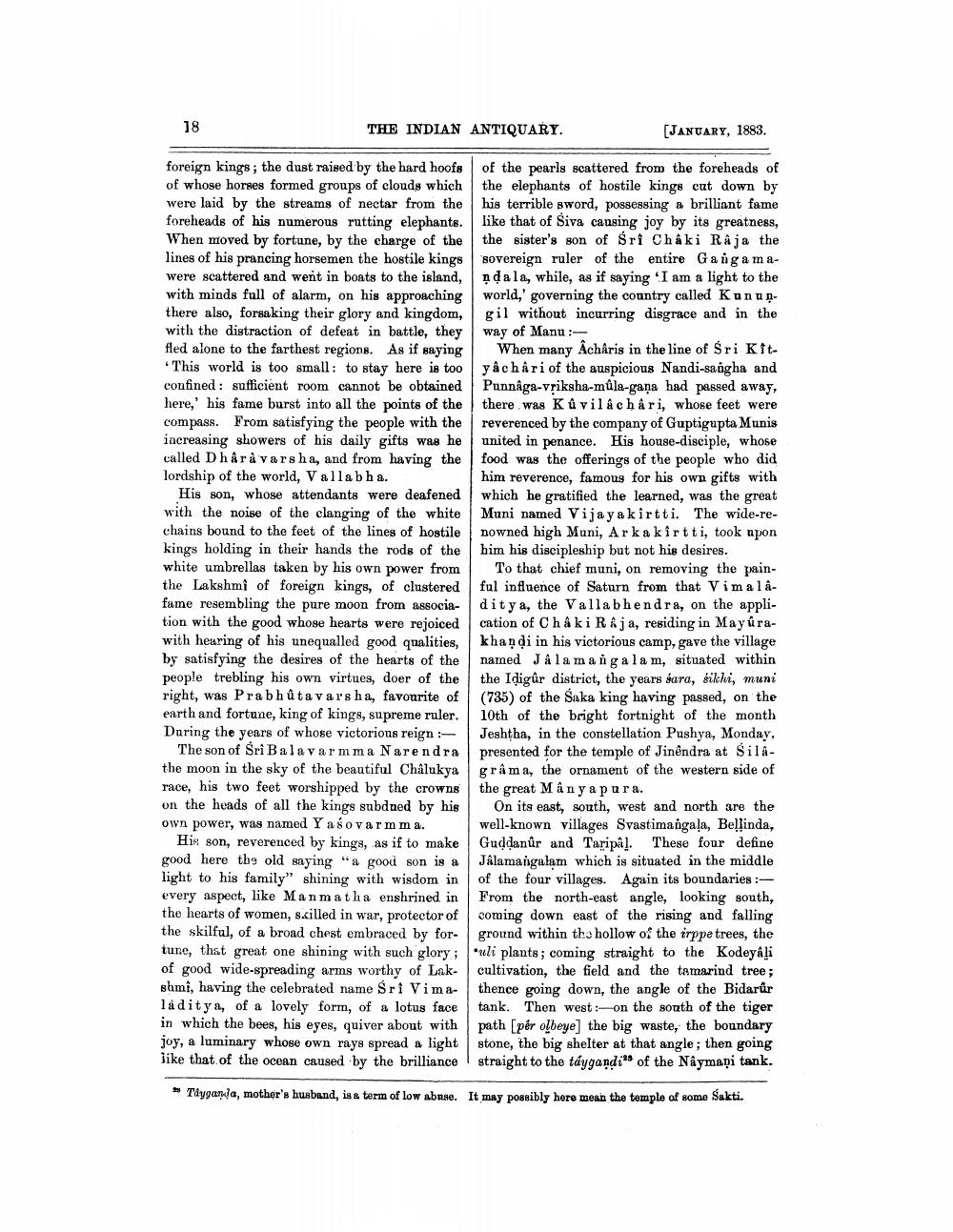________________
18
THE INDIAN ANTIQUARY.
foreign kings; the dust raised by the hard hoofs of whose horses formed groups of clouds which were laid by the streams of nectar from the foreheads of his numerous rutting elephants. When moved by fortune, by the charge of the lines of his prancing horsemen the hostile kings were scattered and went in boats to the island, with minds full of alarm, on his approaching there also, forsaking their glory and kingdom, with the distraction of defeat in battle, they fled alone to the farthest regions. As if saying This world is too small: to stay here is too confined: sufficient room cannot be obtained here,' his fame burst into all the points of the compass. From satisfying the people with the increasing showers of his daily gifts was he called Dhârâ varsha, and from having the lordship of the world, Vallabha.
His son, whose attendants were deafened with the noise of the clanging of the white chains bound to the feet of the lines of hostile kings holding in their hands the rods of the white umbrellas taken by his own power from the Lakshmi of foreign kings, of clustered fame resembling the pure moon from association with the good whose hearts were rejoiced with hearing of his unequalled good qualities, by satisfying the desires of the hearts of the people trebling his own virtues, doer of the right, was Prabhutavarsha, favourite of earth and fortune, king of kings, supreme ruler. During the years of whose victorious reign:
The son of Sri Bala varmma Narendra the moon in the sky of the beautiful Chalukya race, his two feet worshipped by the crowns on the heads of all the kings subdued by his own power, was named Yasovarmma.
His son, reverenced by kings, as if to make good here the old saying "a good son is a light to his family" shining with wisdom in every aspect, like Manmatha enshrined in the hearts of women, skilled in war, protector of the skilful, of a broad chest embraced by fortune, that great one shining with such glory; of good wide-spreading arms worthy of Lakshmi, having the celebrated name Śri Vimaladitya, of a lovely form, of a lotus face in which the bees, his eyes, quiver about with joy, a luminary whose own rays spread a light like that of the ocean caused by the brilliance
[JANUARY, 1883.
of the pearls scattered from the foreheads of the elephants of hostile kings cut down by his terrible sword, possessing a brilliant fame like that of Šiva causing joy by its greatness, the sister's son of Sri Châki Raja the sovereign ruler of the entire Gangamandala, while, as if saying 'I am a light to the world,' governing the country called Kunangil without incurring disgrace and in the way of Manu:--
When many Achâris in the line of Sri Kityâchâri of the auspicious Nandi-sangha and Punnaga-vriksha-mula-gana had passed away, there was Kûvilâchâri, whose feet were reverenced by the company of Guptigupta Munis united in penance. His house-disciple, whose food was the offerings of the people who did him reverence, famous for his own gifts with which he gratified the learned, was the great Muni named Vijayakirtti. The wide-renowned high Muni, Arkakirtti, took upon him his discipleship but not his desires.
To that chief muni, on removing the painful influence of Saturn from that Vimalâdity a, the Vallabhendra, on the application of C hâki Raja, residing in Mayúrakhan di in his victorious camp, gave the village named Jalamangalam, situated within the Idigûr district, the years sara, sikhi, muni (735) of the Saka king having passed, on the 10th of the bright fortnight of the month Jeshtha, in the constellation Pushya, Monday, presented for the temple of Jinendra at Silagrama, the ornament of the western side of the great Mânyapura.
On its east, south, west and north are the well-known villages Svastimangala, Bellinda, Guddanûr and Taripal. These four define Jâlamangalam which is situated in the middle of the four villages. Again its boundaries:From the north-east angle, looking south, coming down east of the rising and falling ground within the hollow of the irppe trees, the uli plants; coming straight to the Kodeyâli cultivation, the field and the tamarind tree; thence going down, the angle of the Bidarûr tank. Then west:-on the south of the tiger path [per olbeye] the big waste, the boundary stone, the big shelter at that angle; then going straight to the taygandi" of the Nâymapi tank. It may possibly here mean the temple of some Sakti.
Tâyganda, mother's husband, is a term of low abuse.




